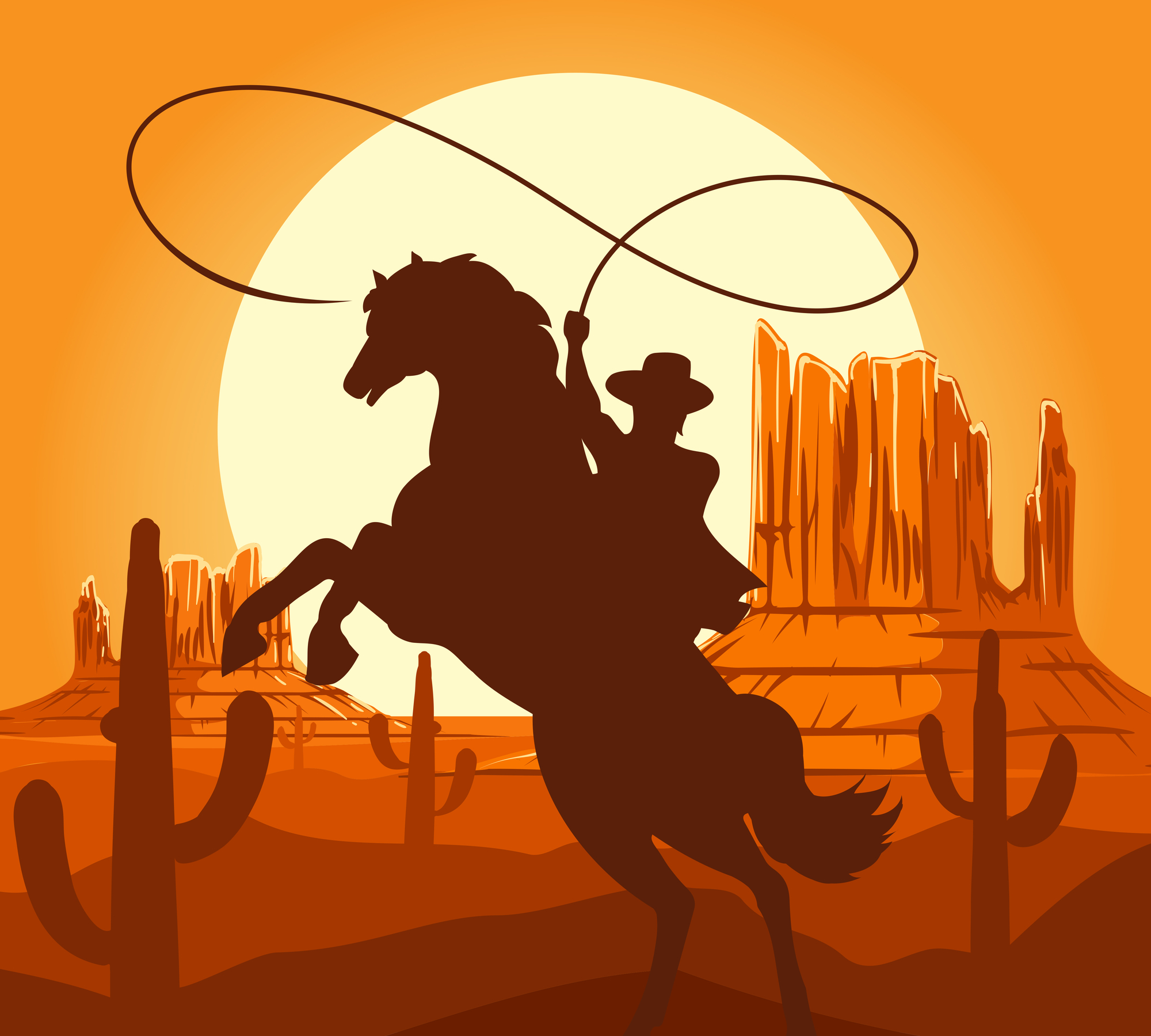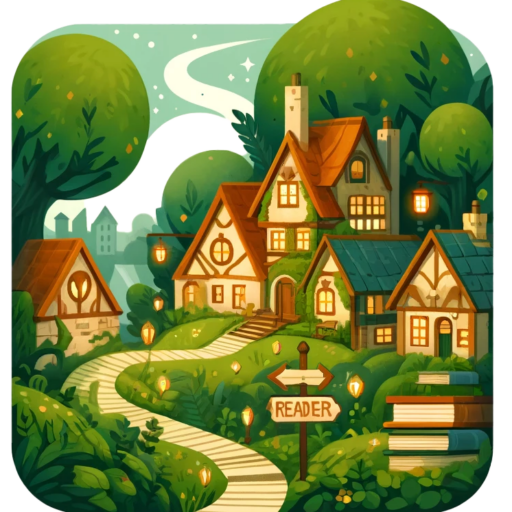Reader's Hamlet
Where stories settle and readers gather
Defining Western Tropes

The Western genre captures the rugged, lawless, and expansive spirit of the American frontier. It’s filled with iconic characters, dramatic conflicts, and vivid settings that transport us to a world of cowboys, saloons, and untamed landscapes.
Like many tropes, these exist because they continue to work throughout the years, from Louis Lamour to modern Western writers. From shows like Deadwood and Yellowstone, this genre continues to resonate with viewers and readers.
Below is a list of classic Western tropes that highlight the genre’s enduring appeal. Use these to help define what your book is about, and add them to your uploads when submitting your book informatoin to Authorszen. This will help readers find your work, and will help you reach those who are looking for your brand of fiction.
- The Lone Cowboy Hero: A rugged individualist who fights for justice in a chaotic world.
- The Damsel in Distress: A woman in peril, often saved by the hero.
- The Evil Cattle Baron or Landowner: A corrupt tycoon seeking control over land and resources.
- The Saloon as a Social Hub: A lively venue for drinking, gambling, and town gossip.
- The Showdown at High Noon: A dramatic confrontation between hero and villain.
- The Quick-Draw Duel: A high-stakes gunfight where speed determines survival.
- The Faithful Horse Companion: A loyal steed aiding the hero’s journey.
- The Native American Raid: Often portrayed as attacks on settlers or towns.
- The Gold Rush and Prospecting: Stories of treasure hunting and rivalry.
- The Stagecoach Journey: Adventures and perils faced while traveling the frontier.
- The Bank Robbery: Outlaws targeting the town’s financial lifeline.
- The Train Heist: Criminals raiding a moving train, often thwarted by the hero.
- The Wanted Poster: Displaying an outlaw’s crimes and a reward for capture.
- The Hanging Judge: A stern magistrate dealing harsh justice.
- The Frontier Doctor: A healer bridging civilization and wilderness.
- The Preacher with a Dark Past: A religious leader with a violent or mysterious history.
- The Prostitute with a Heart of Gold: A kind sex worker pivotal to the plot.
- The Greenhorn from the East: A naive outsider adapting to the frontier.
- The Wise Old Native American Chief: An elder providing wisdom to the hero.
- The Corrupt Sheriff: A lawman exploiting his authority.
- The Bounty Hunter: A relentless pursuer of outlaws for profit.
- The Cattle Drive: Herding livestock across rugged terrain.
- The Campfire Scene: Characters bond or strategize around a fire.
- The Ghost Town: An abandoned settlement, often with eerie secrets.
- The Outlaw Gang: Criminals banding together against the law.
- The Frontier Fort: A military outpost offering protection.
- The Buffalo Hunt: Scenes of hunting buffalo for survival or sport.
- The Cavalry Charge: Soldiers rushing to rescue or engage in battle.
- The Telegraph Office: A hub for long-distance communication.
- The Pony Express Rider: A daring messenger braving the elements.
- The Frontier Wedding: Marriage ceremonies blending culture and survival.
- The Wanted Outlaw Seeking Redemption: A criminal’s journey toward atonement.
- The Marshal Upholding the Law: A stalwart defender of justice.
- The Frontier Funeral: Solemn burials marking the harshness of life.
- The Saloon Brawl: A chaotic fight, often involving the hero.
- The Card Game with High Stakes: Tense moments at the poker table.
- The Pioneer Wagon Train: Settlers braving dangers together on the trail.
- The Claim Jumper: Someone stealing another’s land or resources.
- The Range War: Clashes over land and cattle.
- The Cattle Rustlers: Thieves driving ranchers to action.
- The desert crossing: Characters must traverse a harsh, arid landscape, facing challenges like thirst and heat.
- The mountain man: A rugged, independent trapper or explorer who lives in the wilderness.
- The frontier photographer: A character who captures images of the frontier, its people, and events.
- The traveling medicine show: A group of entertainers and salespeople who peddle dubious medical cures and treatments.
- The frontier journalist: A writer or reporter who covers news and events on the frontier.
- The singing cowboy: A hero who expresses himself through song, often with a guitar.
- The frontier blacksmith: A skilled metalworker who crafts and repairs tools, weapons, and horseshoes.
- The frontier seamstress: A woman who creates and mends clothing for the frontier community.
- The cattle branding scene: The process of marking livestock with a hot iron to identify ownership.
- The Native American tracker: A skilled Native American who assists the hero in following trails or finding people.
- The frontier barber: A character who provides grooming services and often serves as a source of local gossip.
- The stagecoach driver: A skilled horseman who navigates the stagecoach through dangerous territory.
- The frontier undertaker: A character responsible for preparing the deceased for burial and arranging funerals.
- The frontier schoolteacher: An educated individual who teaches children in a one-room schoolhouse.
- The wanted man’s hideout: A secret location where a fugitive hides from the law.
- The frontier storekeeper: The owner of the general store, providing supplies and goods to the community.
- The frontier saloonkeeper: The proprietor of the saloon, often a central figure in the town’s social life.
- The sharpshooting hero: A protagonist with exceptional skill in shooting, often able to make seemingly impossible shots.
- The saloon piano player: A musician who provides entertainment in the saloon, often playing upbeat tunes.
- The frontier barkeep: The bartender in the saloon, serving drinks and witnessing the town’s drama.
- The Native American ambush: An attack by Native Americans on unsuspecting travelers or settlers.
- The frontier stable: A place where horses are kept, rented, or sold.
- The campfire coffee scene: Characters bonding or discussing plans over coffee around a campfire.
- The saloon girl: A female employee of the saloon who provides entertainment and companionship to patrons.
- The frontier postmaster: The person responsible for handling mail and packages in the town.
- The stagecoach robbery: Outlaws attacking and robbing a stagecoach, often leading to a chase or confrontation.
- The quick-draw practice scene: The hero honing their shooting skills through target practice.
- The frontier revival meeting: A religious gathering led by a preacher, often held outdoors.
- The Native American peace pipe: A ceremonial tobacco pipe used in Native American rituals or negotiations.
- The frontier jailbreak: The hero or an ally escaping from the town’s jail, often with outside help.
- The campfire ghost story: Characters telling spooky tales around the campfire at night.
- The frontier mining camp: A settlement that springs up around a mining operation, often with a rough reputation.
- The saloon card sharp: A skilled card player who often cheats or swindles others in poker games.
- The frontier wedding celebration: A joyous gathering of the community to celebrate a couple’s marriage.
- The stagecoach way station: A rest stop along the stagecoach route where passengers can eat, rest, and change horses.
- The Native American captive: A white character, often a woman, taken captive by Native Americans.
- The frontier hanging tree: A tree used for executing criminals by hanging.
- The campfire singing scene: Characters singing folk songs or ballads around the campfire.
- The frontier telegraph operator: The person responsible for sending and receiving telegrams in the town.
- The saloon fight over a woman: Two men fighting in the saloon over the affections of a female character.
- The frontier cattle auction: The buying and selling of cattle, often a major event for ranchers.
- The stagecoach chase: Pursuers on horseback chasing after a fleeing stagecoach.
- The frontier circuit judge: A traveling judge who holds court in various towns along a route.
- The Native American burial ground: A sacred site where Native Americans bury their dead.
- The frontier barn dance: A social gathering featuring music, dancing, and courting rituals.
- The saloon poker tournament: A high-stakes poker competition held in the saloon.
- The frontier cattle rustling trial: A legal proceeding dealing with the theft of cattle.
- The stagecoach hold-up: Robbers stopping a stagecoach at gunpoint to steal valuables.
- The frontier medicine woman: A female healer who uses herbal remedies and traditional knowledge.
- The saloon drinking contest: Characters engage in a competition to consume the most alcohol.
- The frontier cattle stampede: A herd of cattle running wild, often causing damage or danger.
- The Native American vision quest: A spiritual journey undertaken by a Native American character for guidance or insight.
- The frontier shotgun wedding: A hasty marriage, often due to pregnancy, with the groom being coerced at gunpoint.
- The saloon showdown over cheating: A confrontation in the saloon over accusations of cheating during a card game.
- The frontier Fourth of July celebration: The town gathers to celebrate Independence Day with festivities and patriotic displays.
- The stagecoach river crossing: The stagecoach must ford a river, facing dangers like strong currents or slippery banks.
- The frontier mining claim dispute: A conflict between miners or prospectors over the ownership of a valuable claim.
- The saloon owner’s hidden past: The proprietor of the saloon has a secretive history that comes to light.
- The frontier canoe chase: Pursuers in canoes chasing after fugitives on a river or stream.
These iconic elements shape the Western genre, reflecting its themes of survival, justice, and freedom. Whether you're writing, watching, or simply enjoying Westerns, these tropes anchor the narratives in timeless appeal. Include these tropes in your upload information for AuthorsZen, and you'll find the readers who are looking for you and your type of books!

Copyright 2025, The Reader's Habit